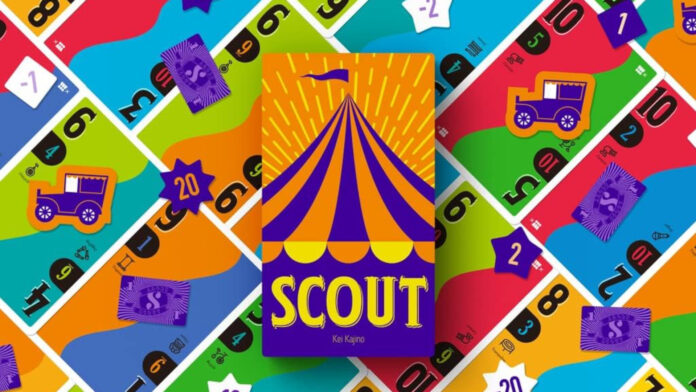Looking for the best card games to play right now? Good news: we’ve tested loads of them to bring you the very best choices in every genre – from snappy 15-minute party games to deep, strategic trading card games. In choosing the best titles, we’ve considered speed and ease of play, tactical depth, compelling themes, and more – so whatever you fancy for your next game night, there’s something to fit the bill here!
These are all distinctive, brand-name card games you can buy from a store. For games with a regular 52-card deck, check out our list of the best playing card games. Or, for a chunkier tabletop experience, try our guide to the best board games.
Why you can trust us ✔ We spend hours testing games, toys, and services. Our advice is honest and unbiased to help you buy the best. Find out how we test.
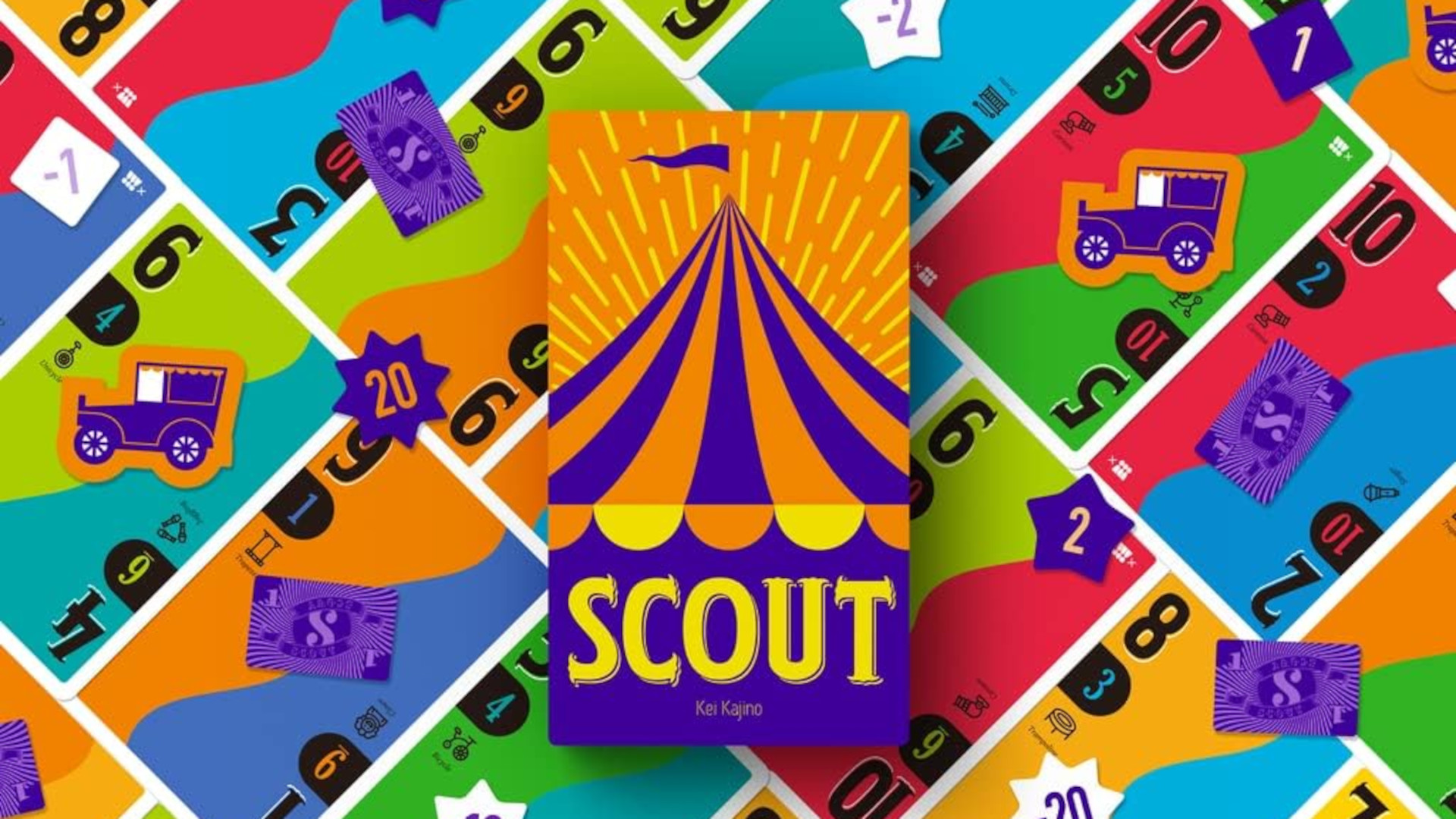
Scout
The best card game for adults overall.
| Publisher | Oink Games |
| Game length | 20 minutes |
| Player count | 2-5 |
| Complexity | 2/5 |
- Unique, innovative card rules
- Systems are in perfect balance
- Gorgeous, colorful design
- Rules are tough to explain to kids
- Gameplay doesn’t use the circus theme
Easily the most celebrated of the many reasonably priced, pocket-sized card games from Japan-based Oink Games, Scout has scooped a bunch of awards and nominations since coming out in 2021 – and we think it deserves every single one.
At first glance, it’s a dead easy set-building game, similar to classics like Rummy or Whist: you’re looking to collect and play down sets of same-numbered cards or sequential runs, with higher value sets beating lower ones.
You can supplement your sets by picking up some of what opponents lay down, introducing some weightier, draft-like decisions, and planning. Winning rounds get you VP/money tokens; the player with the most tokens after a set number of rounds wins. So far, so simple.
Here’s where Oink Games’ clever innovations come in, though: it’s not just your opponents’ plays you need to reckon with – you’ll also have to wrangle the cards in your hand. You see, each card has two different number values – one in the top corner, one printed upside down in the opposite bottom corner – and, for most of the game, you’re not allowed to change the orientation or order of any of the cards in your hand.
At the beginning of each round, you can flip your entire hand the other way up if you choose, and, each time you pick up a new card, you can choose exactly where and which way up to place it in your hand – but, apart from that, your hand of cards is locked in place, out of your control.
It makes the set-building gameplay much more interesting, allowing extra levels of strategic planning and push-your-luck moments. Each turn, you’ll do one of three things:
- ‘Show’ – play down a set with a higher value than the last one played, claiming that the prior set of cards to earn you points at the end of the round.
- ‘Scout’ – pick one card from either end of the last played (‘prior’) set – but you can’t take one from the middle, as what’s left behind must remain a valid set. The player that laid down that prior set gets 1VP from the supply each time this happens.
- ‘Scout and Show’ – once per round, each player can spend one chance to do both actions in one go: pick up a card from the prior set, then immediately Show a stronger set to replace it.
The round ends when someone’s played down a set that nobody else can beat, with every other player forced to Scout in succession. Everybody then gets one point for each card claimed from a set they replaced with their own, and one extra point for each VP they’ve gained from being Scouted. The one with the most points wins the round.
It’s simple, but the limitations and strategic costs placed on set building – both collecting cards from the table and planning to structure your hand correctly – add a level of depth and playability that’s simply magic, and supremely replayable. Scout is an essential card game that’s as perfect for filling a 15 or 30-minute slot as it is for driving a whole night of fiendish gaming.

Love Letter
The best quick card game.
| Publisher | Z-MAN Games / Asmodee |
| Game length | 20 minutes |
| Player count | 2-6 |
| Complexity | 2/5 |
- Incredibly easy to teach
- Sublime design creates rapid, moreish games
- Lovely red and gold drawstring bag for storage
- Gameplay wears thin in longer sessions
- Cards could be a bit more durable
The best card games don’t need to have a weighty deck packed with countless different options to provide a good time. In fact, Love Letter proves that they only need 16. That’s all that’s inside this uber-light, uber-fun classic, which is ideal for the tabletop gamer on a budget (or who’s running low on cupboard room).
Love Letter has a charming premise. The players are each suitors, trying to send letters to a princess by selecting the right court member as courier, while intercepting their rivals’ wooing efforts.
This translates to a fast-paced game of canny social deduction, where you must figure out which cards your opponents have in their possession, and eliminate them using your own.
Simple to teach and dead easy to jump into, Love Letter makes for a brilliant warmup game. Also, because rounds are so short and cards move around so quickly, you’re never holding the same hidden hand for long, making this that rare thing: a social deduction game that’s still enjoyable for the virtuous among us with no fibbing skills.

The Fox in the Forest
The best trick taking card game
| Publisher | Renegade Game Studios |
| Game length | 30 minutes |
| Player count | 2 |
| Complexity | 2/5 |
- Simple, but engaging gameplay
- Lovely, dreamy, fantasy art style
- Devious scoring method is a stroke of genius
- ‘Play to lose’ mechanic takes some getting used to
- No real story or theme to match the art
A trick-taking two player card game, The Fox in the Forest has a lovely fairy tale theme and adorable artwork – the cutesiness perhaps belying the meaty, satisfying puzzle that lies within.
A game of The Fox in the Forest is played across 13 tricks. In each of these, the leading player will lay a card. The following player must then play a card of the same suit, if they can, and any card from their hand if they cannot. The player with the highest card in the leading suit, or the highest card in the trump suit, determined at the start of the game, wins the trick. The winner then becomes (or remains) the leading player for the next trick.
It’s all about when to expend resources, then, as you want to win tricks by as little as possible, saving your best cards (many of which have special functions) for when you really need them. One very clever rule transforms the experience from enjoyable to exceptional: the scoring mechanism.
You see, you want to win as many tricks as possible, but if you triumph in 10 or more of the 13, you are punished for your greed and don’t win any points. That means at any time, your opponent might switch from trying to best you to trying to throw away winning tricks in spectacular fashion. It adds a whole new layer of sneaky tactics to an already pretty fiendish little game.

Magic: The Gathering
The best trading card game.
| Publisher | Wizards of the Coast |
| Game length | 15 – 120+ minutes, depending on format |
| Player count | 2-6 (more and things get confusing) |
| Complexity | 4/5 |
- Endless strategic variety
- Compelling fantasy lore and art
- Superb, free to play digital version
- Expensive to collect via random card packs
- High skill ceiling can be tough for newcomers
- Advanced rules and formats can get complex
The distinguished paterfamilias of trading card games, Magic: The Gathering sits near the head of the table here for good reason. Simple to learn, but unfathomably difficult to master, Magic is a game with history behind it, one that can be appreciated as much for its beautiful artwork and interesting storytelling as for its tight gameplay and challenging deckbuilding.
The great thing about MTG is the sheer variety of experiences it has to offer, from the constantly shifting MTG Standard meta to MTG Commander‘s exciting, over-the-top turns.
From lean, mean aggro decks; to infuriating, opponent-stymying control decks; to absurd jank decks that only come together 10% of the time, but when they do are things of beauty; Magic’s a fount of diverse experiences.
Yet despite all these options, the most popular way to play is still ‘kitchen table’ Magic – just duking it out with your friends using whatever cards you happen to own – and that’s heaps of fun too. Check out the MTG release schedule for more Magic news.

Coup
The best social deduction card game.
| Publisher | Indie Boards & Cards |
| Game length | 15 minutes |
| Player count | 2-6 |
| Complexity | 2/5 |
- One of the best bluffing games ever made
- Simple card abilities interact in fun ways
- Cyberpunky card art is iconic
- Relies a lot on social interaction, not everyone’s forte
- A little expensive for what you get
If you’ve never played Indie Boards & Cards’ mega-successful bluffing card game Coup, you’re missing out on an entire barrel full of dystopian, cyber-politicking fun.
It’s a social deduction game, a delightful ballet of secrets and lies in which the cards you have are much less important than the cards you can convince people you have. In each game, you’ll be dealt just two cards, face down and in secret – each depicting a particular character in the backstabbing ‘royal’ court of a corrupt, futuristic corporate dictatorship.
These two characters are your key allies at court, each printed with its unique ability – some making active steps to your advantage; others allowing you to block or negate your rivals’ moves. The two face-down cards also represent your vital resource: influence. Get outmaneuvered or caught in a bluff attempt, and you’ll have to flip one face-up. Flip both, and you’re out.
Each player could have the Duke, the Assassin, the Captain, the Ambassador, or the Contessa, in any combination – there are three copies of each in the 15-card deck, so you’ll have to calculate the probabilities for yourself based on the number of players, and start deducing what everyone has from second one of the game.
See, you win at Coup by spinning better lies than your opponents and using the balance of unknown identities at the table to your advantage. While your characters (a.k.a. lives) remain hidden, you can pretend your court allies are whoever you want them to be, using the cards’ abilities without having to prove to the other players that you have the card in question.
Each turn, you’ll do one of four things:
- Claim one coin as income
- Claim two coins as ‘foreign aid’ (but this can be blocked by the Duke)
- Claim to have a character and use its action
- If you have seven coins, you must spend them to launch a coup, immediately causing a chosen player to lose one influence, flipping one of their cards
Whenever you use a character action (or counter-action against another player), any player who thinks you’re lying about having that card. If you do have it, they immediately lose one influence and flip a card. If you were lying, the same thing happens to you. The last player left with a face-down card wins, and rules the land for eons of exploitative corpo profits to come.
Once you and your pals learn the dance and get a feel for the back and forth of each card’s special abilities, Coup can move very quickly – but it’s never about the cards; it’s all about staring your opponents in the eye, and daring them to take a chance.
Sure, they could challenge you – but what if you’re telling the truth? But if they delay too long, you’ll rack up the coin to take them out permanently via coups. So the question is: are they feeling lucky?

Pokémon TCG
The best card game to indulge your nostalgia.
| Publisher | The Pokémon Company |
| Game length | 15-60+ minutes |
| Player count | 2 |
| Complexity | 3/5 |
- Stunning card art and holographic cards
- Simpler, more accessible rules than MTG
- New free to play digital version works great
- It’s a TCG, so you’ll spend a lot on random card packs
- With over 1000 Pokémon now, there’s a lot to learn
The technicolor, monster-battling behemoth that is the Pokémon Trading Card Game is everything you remember from your childhood, and so much more. Learning how to play Pokémon cards is a remarkably easy matter – particularly for a long-running collectible card game: these things tend to accrue new, more complicated rules over time, but Pokémon prides itself on being accessible to all.
The Pokémon TCG has a very satisfying loop of playing creatures that you power up and evolve as matches go on. Understandably, given its source material, it has a unique emphasis on the monsters that make up your deck. Keeping them alive – sorry, un-fainted – while knocking out your opponents’ is not just a means to an end, but the game’s main victory condition.
It’s frankly surprising what a great job this card game does of emulating the feel of Pokémon battles while using entirely different mechanics. If you’re a fan of Pocket Monsters (the chances are good, it’s literally the largest media franchise in existence) and you haven’t tried the card game, you owe it to yourself to give it a whirl. It’s free to play online too, so really you’ve got no excuse.
If you fancy becoming a trainer, we can help – check out our guides on how to build a Pokémon deck, as well as the best Pokémon cards and the most powerful Pokémon TCG decks in the game’s current meta. If you’re more interested in investing, we also track the world’s most valuable rare Pokémon cards.

Yugioh Trading Card Game
The best card game for anime fans.
| Publisher | Konami |
| Game length | 15-40 minutes |
| Player count | 2 |
| Complexity | 3/5 |
- Core gameplay is mega easy to learn
- Fantastic anime theme and artwork
- Online play is better than ever
- Learning curve gets steep, quick
- High level decks can wipe you out
- Cards can be hard to read
There’s a fair bit of competition for the title of best anime card game these days – the One Piece TCG is blowing up right now – but we think Yugioh Trading Card Game is the one you should try.
If you’ve ever watched the Yugioh anime, you’ll know the appeal of larger-than-life characters summoning bizarre monsters and magic in epic duels – and Yugioh cards capture that in gloriously over-the-top fashion. If you find Magic: The Gathering takes itself too seriously, you’ll love the irreverent, vibrant nonsense that goes on in every game of Yugioh!
Compared to other TCGs we love, like MTG and Pokémon, Yu-Gi-Oh! also jettisons a lot of the strategic layers and resource systems, in favor of super-fast gameplay and building powerful, game-winning combos – often relying on devastating use of the famous Trap Cards (hidden surprises that lay in wait for your opponent).
The result is an iconic anime card game that’s quick and simple to learn, but harbors enough competitive depth and complex combo plays to keep play frenetic and fun every time. Plus, it’s popular in every local game store, and the newest free to play digital edition – Yugioh Master Duel – has really hit its stride, so you’ll never be short of an opponent.
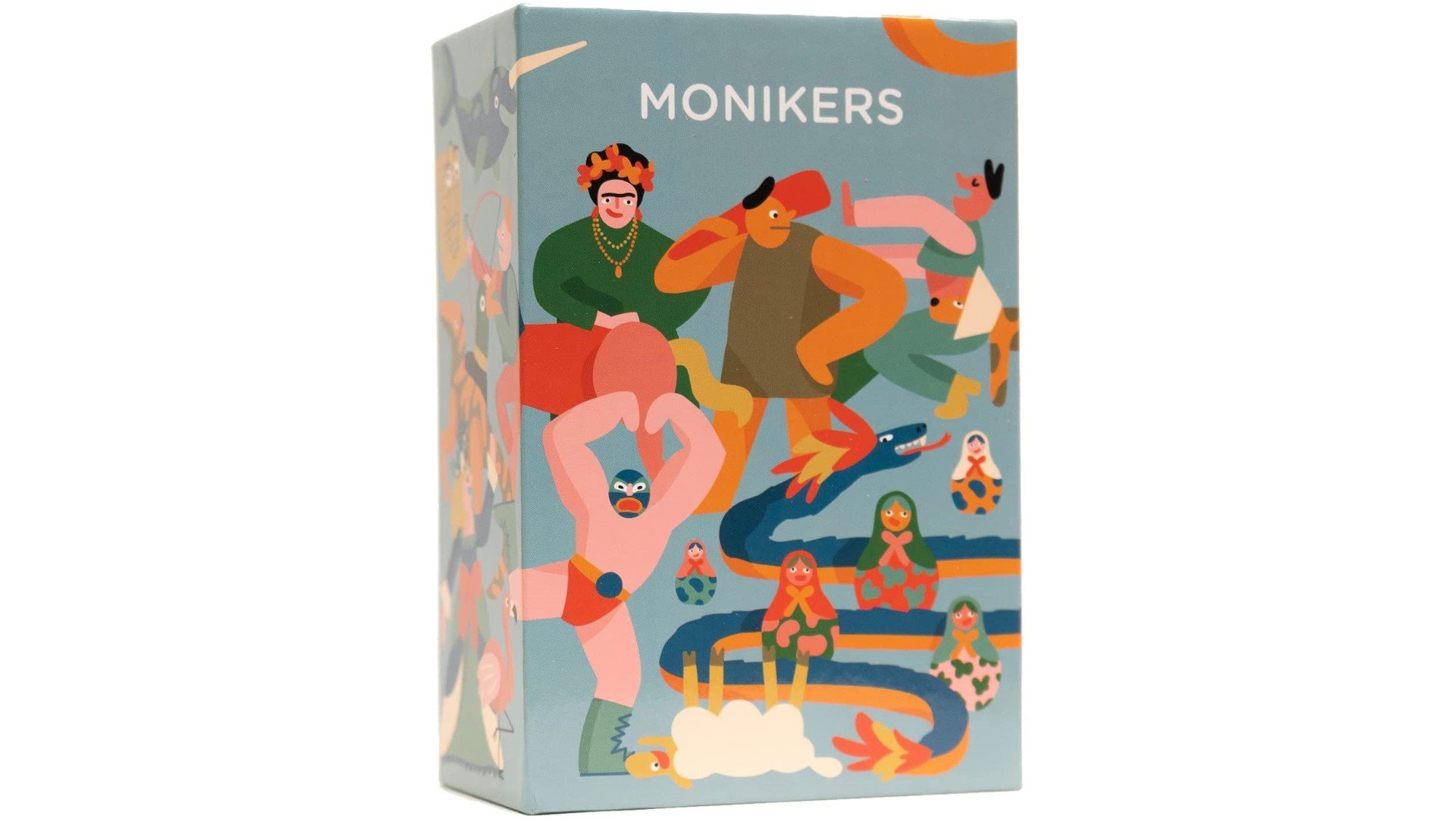
Monikers
The best party card game for adults.
| Publisher | CMYK |
| Game length | 30-60 minutes |
| Player count | 4-16+ |
| Complexity | 1/5 |
- One of the best party games ever
- Literally anyone can learn to play in seconds
- Art is super, and cards are good quality
- Quite expensive, for a game you can play free
Monikers is based on a folk game so old that no one knows where it came from. It might have been invented by a particularly enterprising velociraptor, who can say? And listen, as I explain the premise, it’s going to sound an itty bit like Charades, but trust me, with the right group of people, Monikers is a riot.
In Monikers, players take turns describing a series of characters to their team. In the first round, clue-givers can say anything they want, except the character’s name. In the second round, they can only utter one word (or noise) for each character, and in the third, they can only mime. Cards range from the mundane (Bob Ross, Marie Antoinette) to the seriously outlandish (Doge, Manic Pixie Dream Girl, or just ‘Nobody’).
Sounding like an impossible challenge so far? Well, it kind of is. The frustration is half the fun, but the other half comes from the fact that the same deck is used across each of the three rounds, meaning in-jokes form and your group develops a kind of – very silly – shared language. A party game with a higher hit rate than most, if your goal is goofy entertainment, there’s no better funny card game for adults than Monikers.
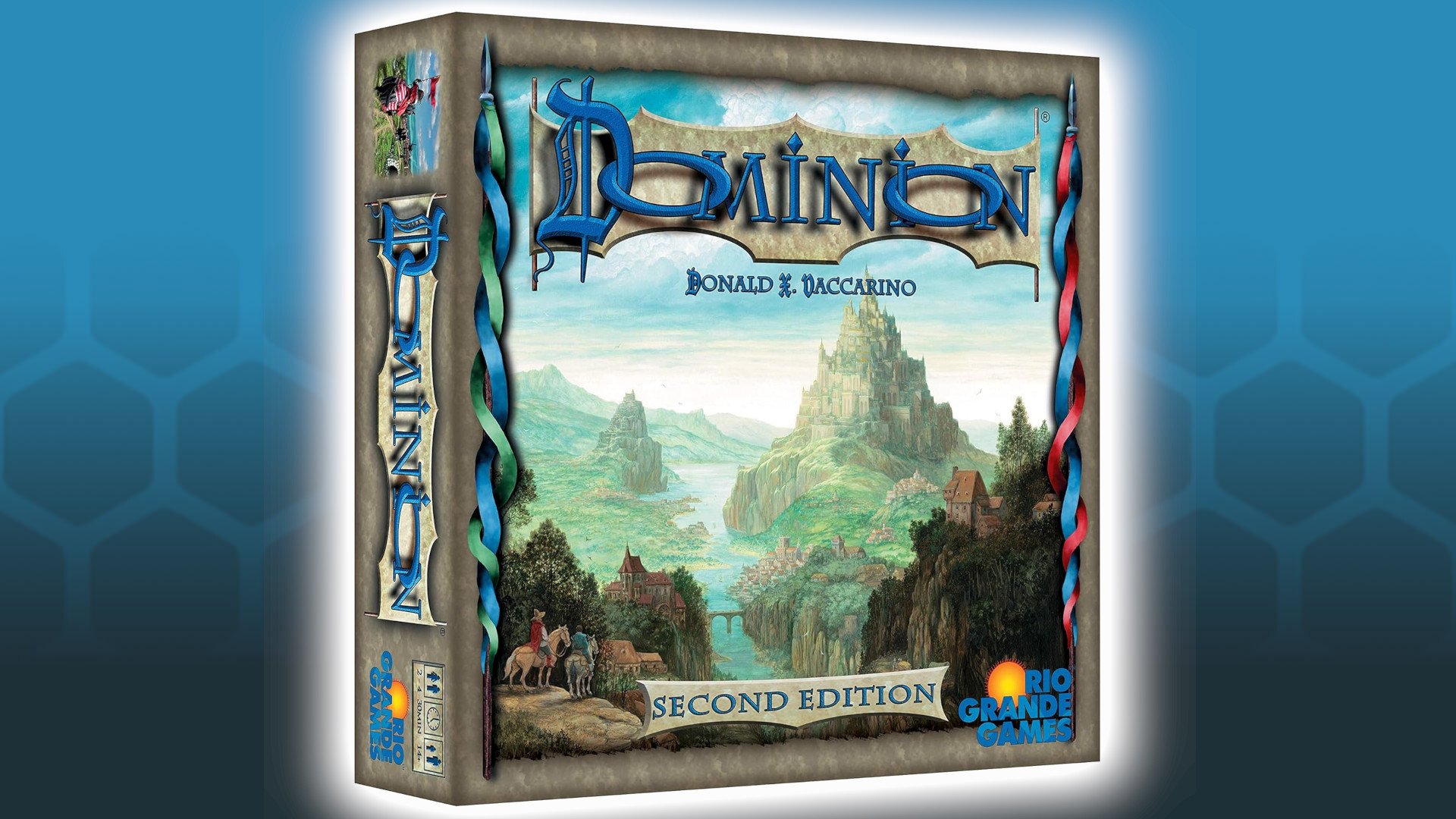
Dominion
The best non-TCG deck building game.
| Publisher | Rio Grande Games |
| Game length | 30 minutes |
| Player count | 2-4 (up to 6 with expansions) |
| Complexity | 3/5 |
- Vast range of strategic choices
- Loads of expansions add cool new cards
- Medieval theme feels old-fashioned
- Some expansions are pretty expensive
If you’re attracted to the strategic flavour of collectible trading card games, but don’t fancy blowing hundreds of bucks on extra decks and randomized booster packs, the deck building games genre is perfect for you – and the 2008 classic Dominion sits right at the top of the pile.
In this medieval themed card game, you and your rivals will all start with identical, small decks of weak cards – then take turns drawing and playing cards from a central supply to grow, improve, and refine your deck; rack up victory points; and screw over the other players.
That big, central pool of cards contains a whole circus of tricks and treats you’ll need to plot a strategic course between. Some cards straight-up give you victory points; some generate ‘coins’ you can spend on buying new, better cards; some attack your enemies; some let you react to your enemies attacking you; and so on. Your choices compound, and your chosen deck-building path might outpace your enemies or leave you in their dust.
There’s plenty of strategic deliciousness to be had just from the core box, but, once you feel you’ve seen what it has to offer, there are no fewer than 15 Dominion expansions on offer, each packed with extra cards that add brand new game features, as well as their own distinct themes.
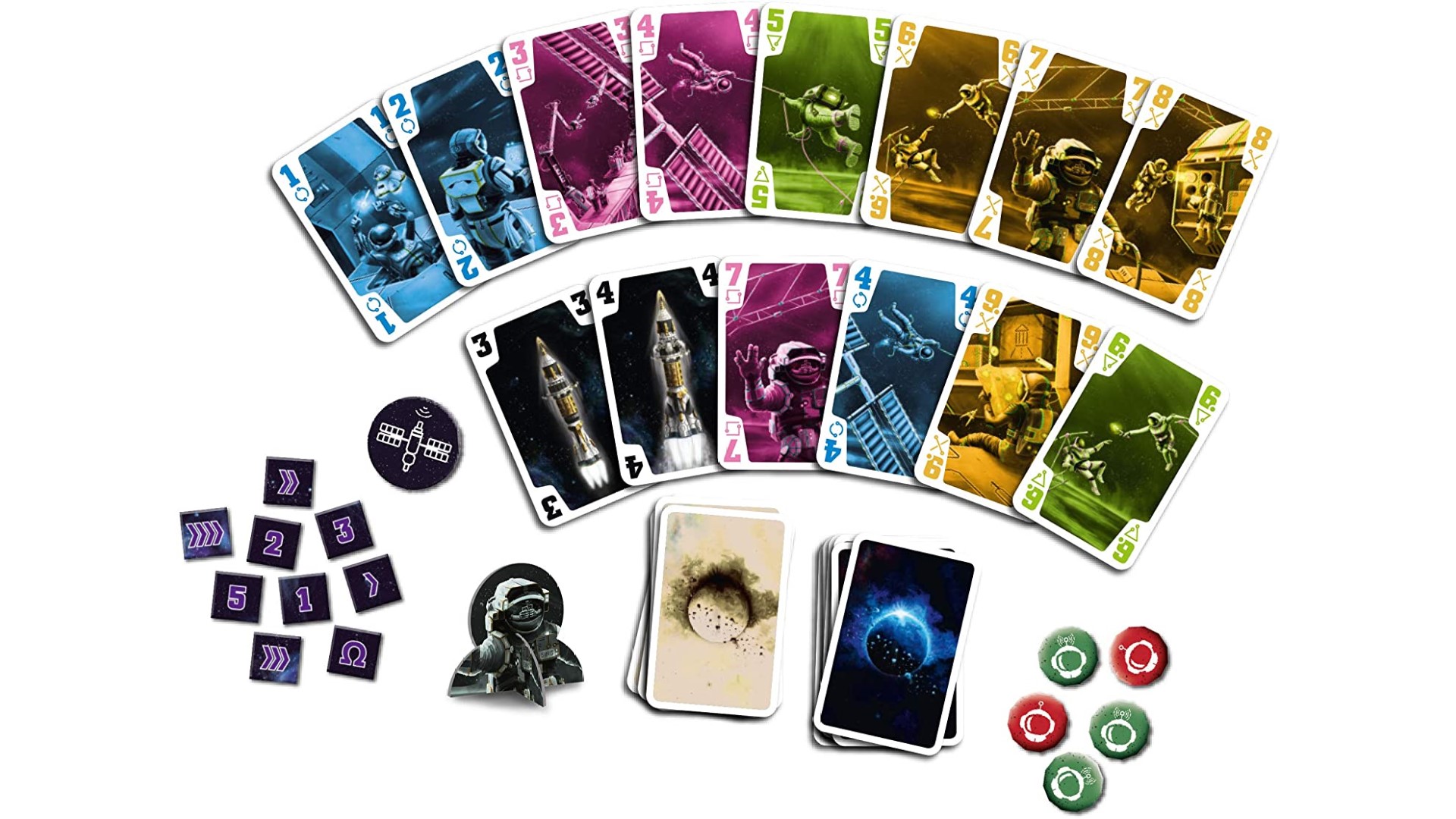
The Crew: The Quest for Planet 9
The best co-op card game for adults
| Publisher | Kosmos |
| Game length | 20 minutes |
| Player count | 2-4 |
| Complexity | 3/5 |
- Restricted communications creates intense coop play
- Good value for money, with 50 scenarios in the box
- Playing in silence is a turn-off for some
- Difficulty is high, and ramps up fast
Another trick-taking game, but this time cooperative – in The Crew: The Quest for Planet 9, players are astronauts on a mission to the final frontier. To succeed, they’ll need to ensure the right players win the right cards in order to complete individually assigned tasks.
But, uh-oh, a complication! There’s a cosmic communication jam caused by space dust or angry Martians or something, which means you have to play in silence, or at least not discuss strategy. You can only describe your hand to your companions with the help of radio tokens, which indicate whether a card you’ve laid is the highest, lowest or only card of its suit that you’re holding.
That means you really have to pay close attention and get into a shared headspace to figure out what each other’s clues mean. It’s easy to go wrong, but, as with another silent board game, Mysterium, misunderstandings are usually funny. You can always yell at your bumbling teammates once the game is complete.
In terms of bang for your buck, the Crew certainly delivers. Packed in its compact box you’ll find 50 scenarios, allowing you to change the game up each time, and face increasingly nightmarish missions. Good job we can’t hear you scream up there!
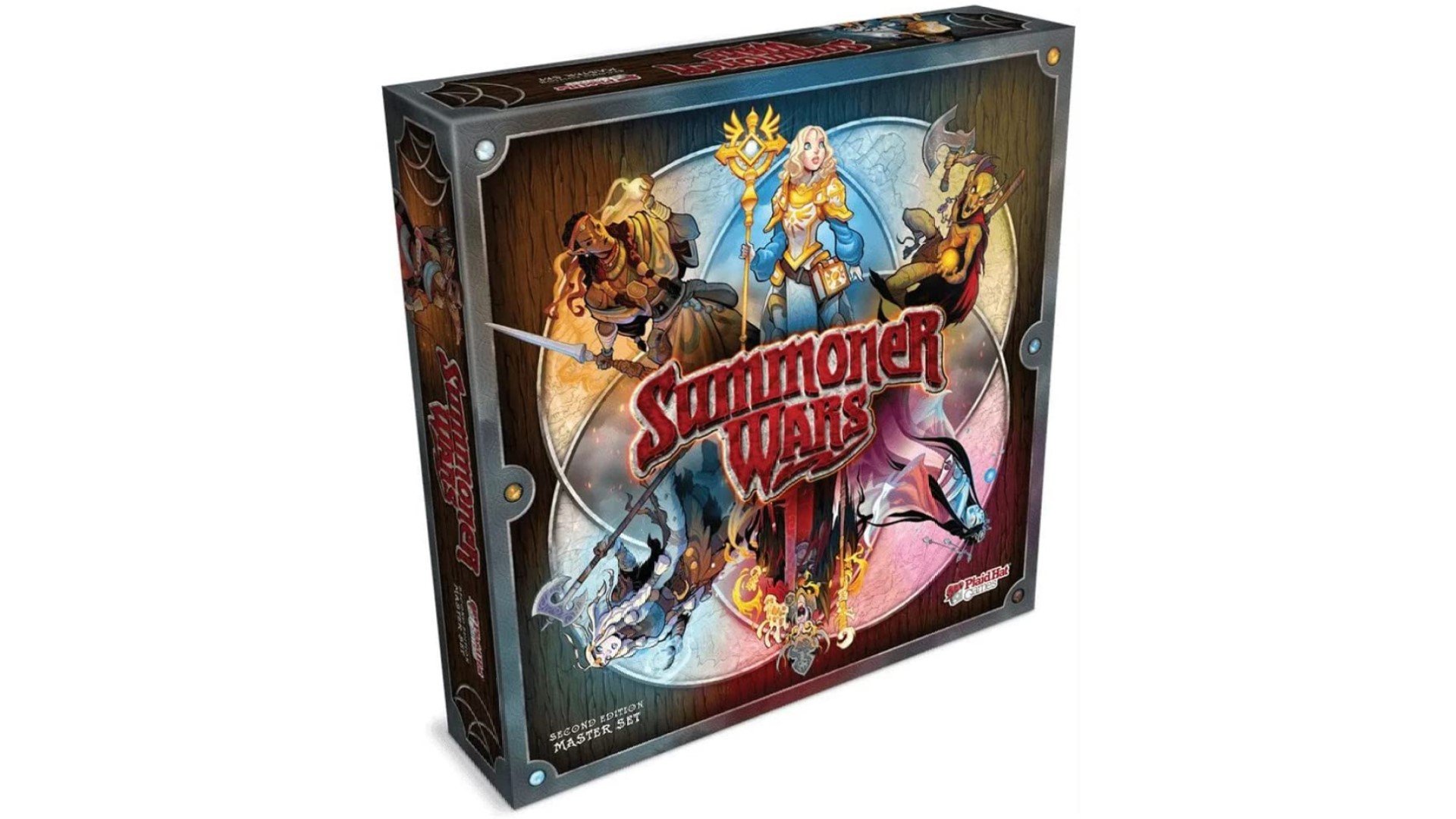
Summoner Wars
The best non-collectible strategy card game.
| Publisher | Plaid Hat Games / Asmodee |
| Game length | 40-60 minutes |
| Player count | 2 |
| Complexity | 3/5 |
- Expansions add awesome asymmetric factions
- Accessible, but with proper strategic depth
- Cartoony new art style isn’t for everyone
- High variancy means a run of bad luck can be deadly
The best strategic card game to play if you’re not into the whole collecting thing and just want everything to come in one box, Summoner Wars, originally released in 2009, was conjured again this year as a second edition, replete with new art, updated rules, and brand new factions to lead into battle.
Whereas, in most combat-focused card games, the fight takes place in an undefined space, in Summoner Wars the battlefield is a board you can slide cards around on. That shakes things up significantly. Structures can be built on your side of the field and creatures can, and often do, get in each other’s way. It’s more turn-based tactics game than standard strategy card or strategy board game.
Another twist is that, instead of your player avatar being a defenceless pile of hit points squatting behind its mates like a big chicken, the summoners in charge of these wars are unafraid to get stuck in and bash some heads. This adds a nice bit of tension – you want to make use of your summoner and also keep them out of harm’s way.
But where Summoner Wars really shines is its asymmetrical factions, from the boost-based Savannah Elves, to the construct-building Polar Dwarves. Each one has its own distinctive playstyle, and with six in the Master Set alone, there are endless memorable matchups to try out.

Arkham Horror: The Card Game
The best story driven card game.
| Publisher | Fantasy Flight Games |
| Game length | 1-2 hours |
| Player count | 1-2 |
| Complexity | 3/5 |
- Arguably the best H.P. Lovecraft game ever
- Campaigns are well written and immersive
- Fantastic artwork sells the Lovecraft setting
- Can be difficult to visualize and navigate locations
- Prepping cards for scenarios is fiddly, and can cause spoilers
- Gets nearly as expensive as TCGs once you’re invested
In Arkham Horror: The Card Game – one of our all time favorite Cthulhu board games – you play a group of mystery-solving paranormal investigators, finding clues and then figuring out how to deal when those clues sprout tentacles and spiky teeth.
Full of co-op – or, optionally, single player – campaigns, it’s genuinely impressive how well Arkham Horror manages to create that big campaign experience (obviously somewhat condensed) using just a few decks of cards.
Tweaking the decks that determine your investigators’ powers, equipment and even their fatal flaws is highly rewarding, and the narratives, though linear, are strongly thematic – with some good twists, turns, and touch choices.
There are plenty of adventures to be found in the base game and loads more available as expansions – as well as new investigators to try out. If you’re a fan of Lovecraftian spookiness and you haven’t mined this particular seam of hobbyist fun yet, it’s well worth giving it a go!
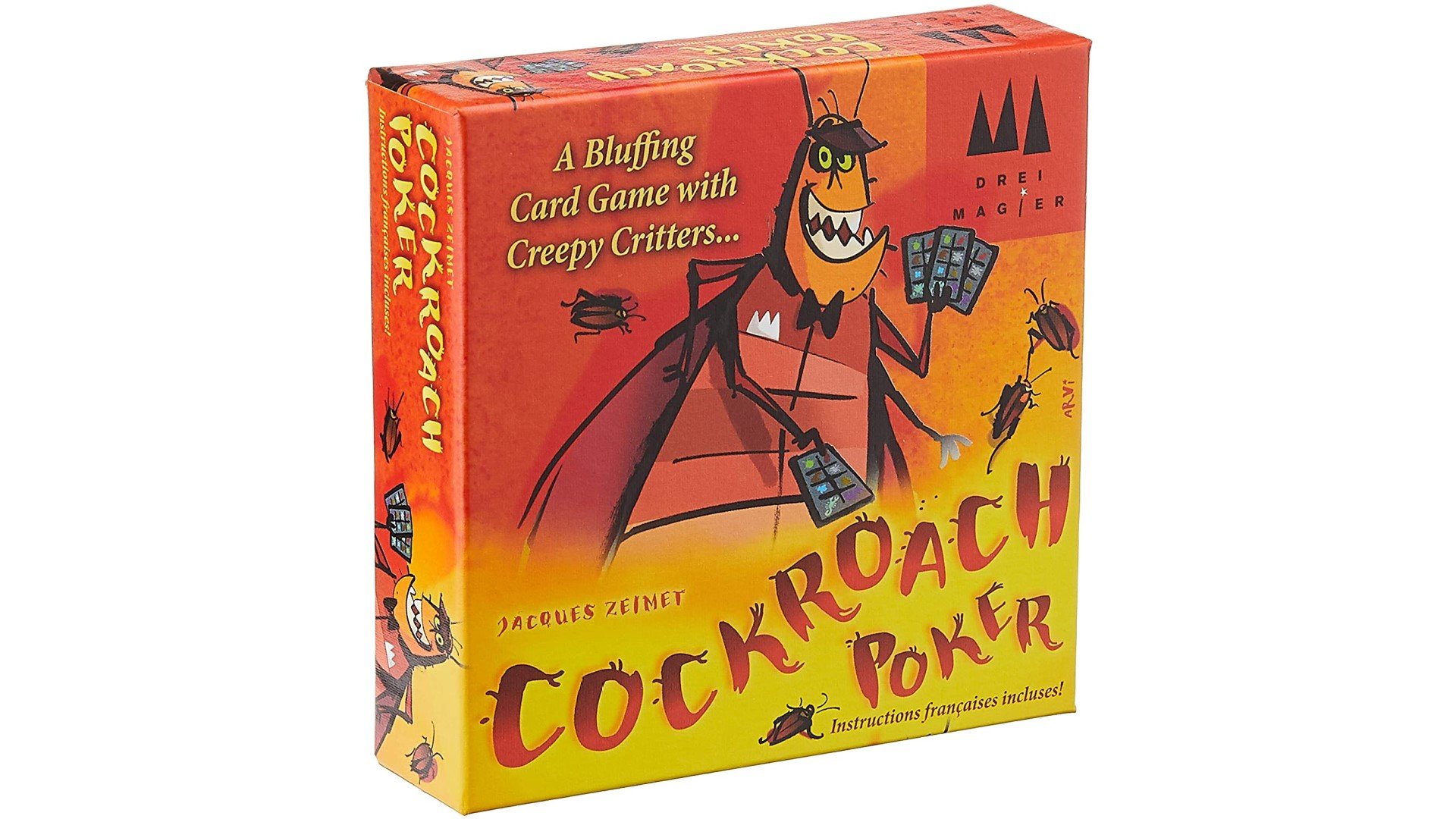
Cockroach Poker
The best pure bluffing card game.
| Publisher | Drei Magier Spiele |
| Game length | 20 minutes |
| Player count | 2-6 |
| Complexity | 2/5 |
- Maybe the purest lying game ever made
- Generates more laughs than any game on this list
- Slightly ‘yucky’ art style isn’t to everyone’s taste
- Bad liars need not apply
There’s no better lie than a shared lie, that’s what they say… Or is it? Perhaps we made that up. Anyway, it’s definitely true that vermin-themed bluffing card game Cockroach Poker (a.k.a. Kakerlaken-Poker in the original German) is stupendous fun. Scout’s honour!
Cockroach Poker is all about handing your mate an animal and, with great audacity, declaring it to be something it isn’t. So you might say a cockroach is a rat, for instance. They can then either make a call on whether you’re lying or not, or pass the card on to the next player.
If they opt for the latter, they look at the card, and then pass it on, either agreeing with your claim (“Yes, that’s one whiskery rat all right”) or coming up with a new one, which just like your own, could be true or false (“Actually, it’s a bat!”).
So, you might end up passing a card all the way down the line, until the last player is forced to untangle this web of utter twaddle and settle the matter of what the damn card truly is once and for all. At which point everyone else, who already knew the answer, collapses in a fit of giggles. It’s absurd, but it’s also absurdly enjoyable.

The best push-your-luck card game.
| Publisher | Space Cowboys / Asmodee |
| Game length | 30 minutes |
| Player count | 2 |
| Complexity | 2/5 |
- Simple to learn, fast to play
- Brilliant risk/reward moments
- Cheap and good-looking
- High randomness means bad luck can screw you
- Resetting between rounds gets tiresome
In Jaipur, players are Indian merchants, trading the finest spices, cloth, gold and camels, all in a tug-of-war to become the wealthiest. On your turn you’ve got just two types of moves to consider: you can buy wares, or you can sell them.
While bonuses are awarded for selling goods in large quantities, each type of good decreases in value as the market becomes flooded. That means there’s a fine balance to strike between selling early and waiting till you have more to sell.
You can also buy all the camel cards in one go, which reveals new, valuable resources your foe can snatch up, but gives you greater purchasing power, as you can trade these even-toed ungulates in later for whatever’s sitting on the shelves.
Jaipur is a game of risk taking, knowing when to push your luck. It’s a great two-player card game because you soon realize that following your opponent’s moves is more important than planning out your own. You’ve got to get a read on what they’re collecting, how much of it they’re likely to have, and the size of their camel fleet. And then you can create a plan of action for screwing them over.
As economic card games go, Jaipur is simple but effective. It’s a quick and easy card game to jump into, and incredibly moreish.
Read our Jaipur review.

Exploding Kittens
The best casual card game for silly fun-times.
| Publisher | Exploding Kittens |
| Game length | 15 minutes |
| Player count | 2-5 |
| Complexity | 1/5 |
- Indecently simple to learn and play
- Never fails to generate fun tension
- Jokey, memey art style will please millennials
- Simplistic mechanics with no real strategy
- Deliberately very random chance driven
- Zero competitive balance
Ever wished Russian Roulette was a little more family friendly? Alright, maybe Exploding Kittens is still a pretty grim mental picture – but at least it’s the kittens exploding, not you. The brainchild of Matthew Inman, creator of webcomic The Oatmeal, this bestselling card game is a direct translation of the comic’s irreverent humor; but it’s still cracking fun even if the jokes aren’t your cup of tea.
Play is simple. Take turns drawing cards, and the first person to draw an exploding kitten is out. The winner is the last survivor, the one person who managed to avoid encountering spontaneous feline combustion.
Of course, there will be plenty of opportunities to push probability in your favour (or screw an opponent over). Other cards in the deck allow you to check what cards are coming up, force other players to draw cards, or even shuffle the deck entirely – so no one knows where the next exploding kitten will come from.
Exploding Kittens may sound a bit simple, but the tension as the deck slowly depletes – and the chance of an exploding kitten grows – will leave you breathless. This is one of the biggest-selling board game Kickstarters ever, and the millions of people who’ve picked up a copy can tell you it’s a worthy buy.
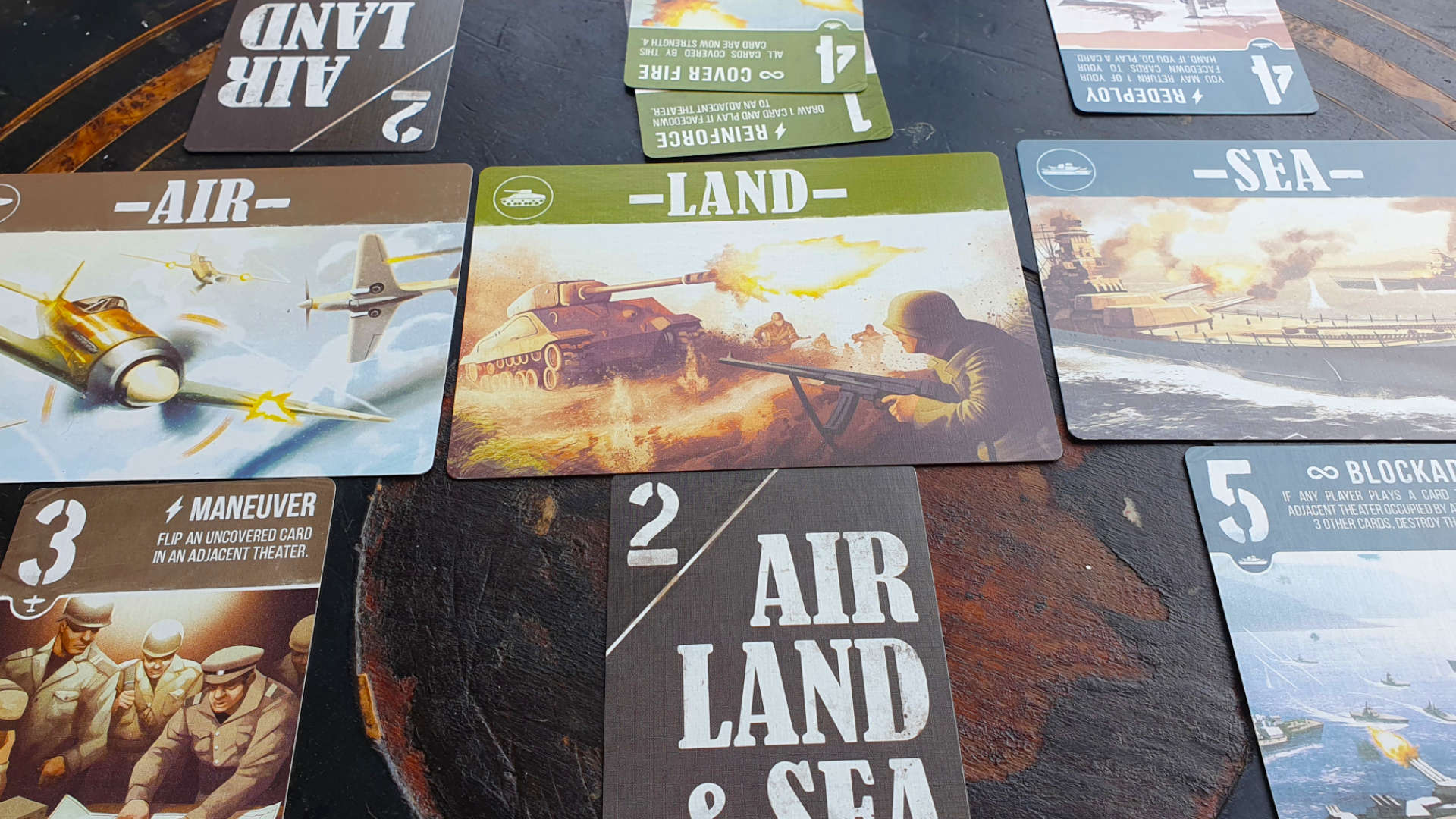
Air Land & Sea
The best war card game
| Publisher | Arcane Wonders |
| Game length | 20 minutes |
| Player count | 2 |
| Complexity | 2/5 |
- Games are quick, tense, and unpredictable
- Option to retreat adds strategic variety
- New players will struggle against experienced ones
- Feels simplistic next to war board games
Air Land & Sea is a deviously simple card game for two players. With just a handful of cards and very few rules it reliably produces nail-biting games, and it plays so quickly it’s incredibly easy to fit in another game – or two – or three…
The game is themed around World War Two (though a cartoony ‘Critters at War’ variant is available if you prefer), with three “theatre” cards laid out between the players representing the battles for the Air, Land, and Sea. Both players will draw a hand of cards from a shared deck, representing your forces.
Each card has a strength score, representing how much it contributes to a battle, from a strength one scout to a strength six tank division. Each card can only be deployed to one type of theatre – there’s no way to get your Aircraft Carriers into the battle for the skies of Europe – but you can play any card face down into any theatre, where it counts as strength two.
You’re fighting to control two out of three battles by having the highest score there at the end of the round – a bit like Marvel Snap. And just like Marvel Snap, your cards have extra powers. They might flip over one of your face-down cards, blow something up, call in reinforcements from the unused cards in the deck, or let you deploy your next unit anywhere you like. The fact you share the deck with your opponent means you’ll have some idea what they’ve got in their hand, but you never know.
But the best twist is in the scoring system. If you think a round’s going against you, you can choose to retreat. You’ll surrender some points to your opponent, but the sooner you retreat, the less your opponent gets. When should you fold? When do you need to go all in? Can you bait your opponent into the trap you’ve set?
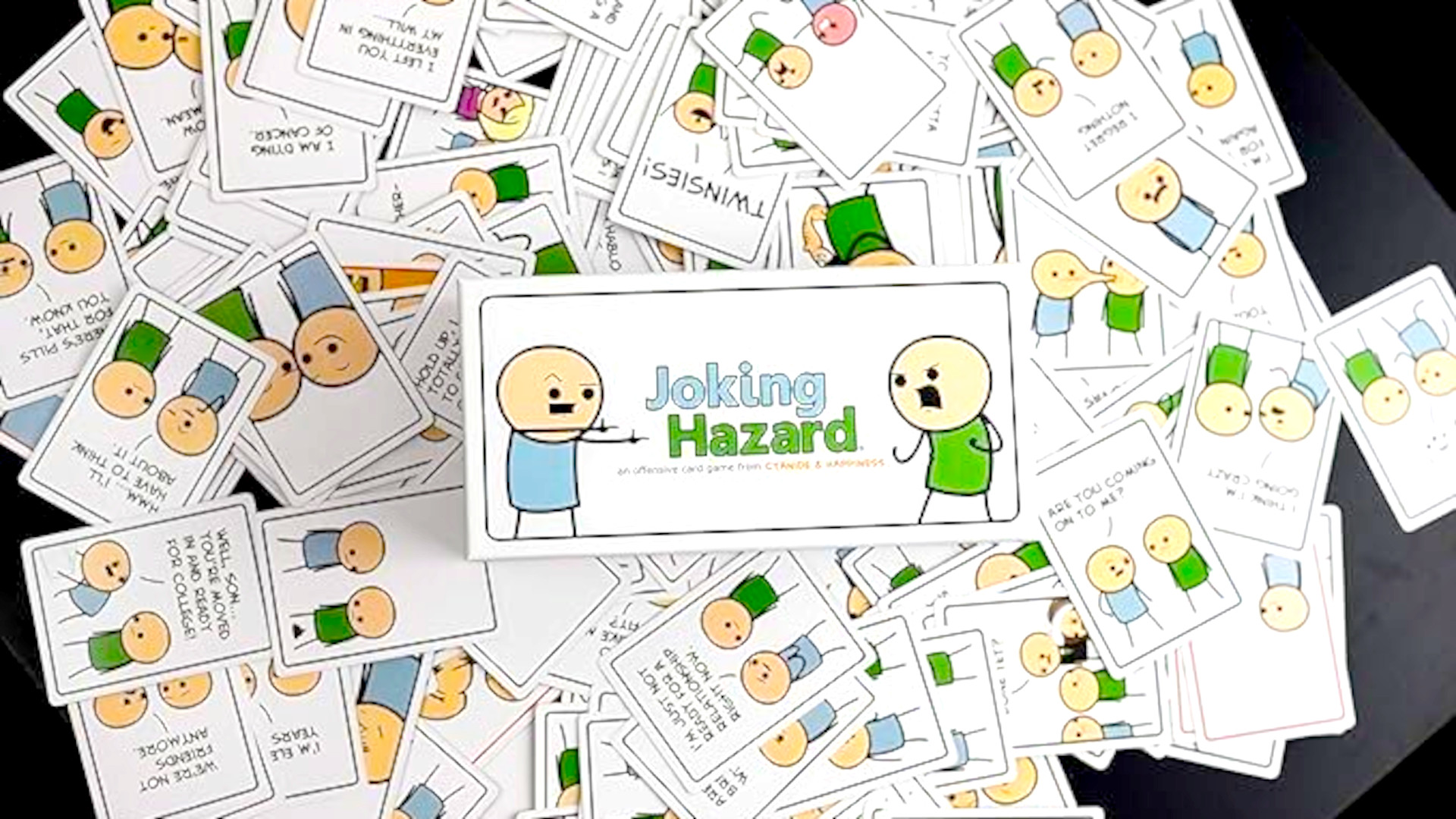
Joking Hazard
The best comedy card game
| Publisher | Cyanide & Happiness |
| Game length | 30-90 minutes |
| Player count | 3-10 |
| Complexity | 1/5 |
- Does the Cards Against Humanity thing, but better
- Tons of silly, rude webcomic art to enjoy
- Still relies on crass shock humor
- Perhaps a bit overpriced
We don’t mean to bag on Cards Against Humanity too much – it was a lot of fun in its day. But we mean it when we say Joking Hazard, from the makers of the Cyanide and Humanity webcomic, is essentially the same experience, only funnier and better.
If you’re thinking we prefer it because we got too squeamish or overly ‘woke’ about CAH’s signature, anti-political correctness shock humor, you’re quite wrong. No, shock humor is a wonderful thing in small doses, and Joking Hazard packs in just as much as CAH ever did. Where this game gets the edge is by doing the same simple, dirty, funny thing – but in a significantly more interesting, creative way.
Where CAH had players select text-only responses to a shared prompt on a single white card, Joking Hazard creates a three-panel comic strip by selecting panels one and two at random from a pool of 350 cards, then having players propose alternate endings to the strip by playing cards from their hand.
At a stroke, this design gives Joking Hazard an extra dimension – pictures – that CAH never had, helping to create more variety between rounds and games by telling a different dumbass story each time. High art it ain’t – but if you and your pals like CAH but have got a bit bored of it, we can heartily recommend this as an alternative.
If you’re looking for the other kind of ‘adult’ games – you should definitely read our guides to the best sex board games and sex card games.
Not got time or money for a new card game? Whip out your phone instead – our sister site Pocket Tactics can help with the latest links for Coin Master free spins.
Source: Wargamer



